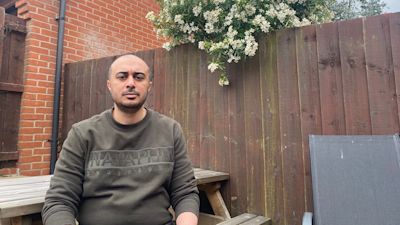Mental Health Awareness Week: Peterborough man on living with OCD

Arif's story is part of a three-part ITV News Anglia series focused on people living with mental health conditions, to mark Mental Health Awareness Week.
A decade ago, Arif Sayeed was married and living in London, having what he calls a "relatively normal life".
But life was turned upside down for the 37-year-old from Peterborough after he started to experience intrusive thoughts, and was diagnosed with Obsessive-Compulsive Disorder (OCD).
It left him grappling with false memories that he had harmed people around him, in what he describes as a "Jekyll and Hyde"-style existence.
"I was living in London at the time, and I just started to have these intrusive thoughts about harming people.
"They got more and more frequent and more and more vivid. So for example, if I was standing at a tube station, I'd have thought of that pushing someone on to the tracks.
"A person who hasn't got OCD will just shrug off those of thoughts. It got to the point where I thought they were memories, and that I'd actually done something like that."
According to OCD UK around three-quarters of a million people in the UK have OCD.
Arif was diagnosed with a form of OCD called "purely obsessional" known as Pure O.
Pure O is where people experience distressing intrusive thoughts but there are little or no external signs of compulsions.
For Arif his intrusive thoughts led him to believe he was living a "double life", worrying that he had hurt someone without remembering.
"I was terrified to go out because I just kept thinking I've harmed somebody.
"The best way to describe it was kind of a Jekyll and Hyde scenario, thinking I was the good character and then all of a sudden all these intrusive thoughts came into my head and I thought I was some kind of monster.
"[It was] like I had some kind of hidden life that I couldn't remember."
Arif has spoken to ITV News Anglia about his experiences as part of a series focused on how people are living with mental health conditions, as part of Mental Health Awareness Week, which runs from 9 to 15 May.
He had to return to Peterborough to get help for his OCD, and moved back in with his parents. He was so scared to leave the house that his anxiety became worse, which led to Arif developing tics.
Tics are fast, repetitive muscle movements that result in sudden and difficult to control jolting of the body or making different sounds. They can happen randomly and may be associated with stress, anxiety, and tiredness, often becoming worse if they are talked about or focused on.
When Arif started to develop tics he was admitted to a psychiatric ward.
"I got the help I needed, the first time around anyway," he said. "[It was] a lot of trial and error. I had therapy and I had to sit with a psychologist and they showed me the thoughts weren't real.
"I came out about three months later and went back to London and about two years later everything had started again.
"I had to be admitted to hospital again and then, unfortunately, my marriage broke up as well. I kind of lost everything.
"But , slowly but surely I picked myself up the therapies and the medication has helped and I am stronger."
For Arif, being diagnosed with OCD was a big comfort - as he felt like he was not alone.
"I can deal with the OCD myself," he said.
"It's such a weight off your shoulders when you know that there's something actually wrong with you rather than thinking as some kind of monster."
He now hopes that by speaking out he can encourage others to speak up about their OCD and make them feel less alone.
"I think the main message just is don't be afraid," he said.
"It's a scary thing to have and it's a very daunting thing to talk to somebody about because you don't know how they're going to react. But with me, a massive weight was taken off my shoulders when they told me that I there was something wrong with me."
OCD-UK operates an advice line is available from 9am-12pm (Mon-Fri) over the phone on 01332 588112 or email OCD UK on office@ocduk.org.
Samaritans operates a 24-hour service available every day of the year, by calling 116 123. If you prefer to write down how you’re feeling, or if you’re worried about being overheard on the phone, you can email Samaritans at jo@samaritans.org
Papyrus offers support for children and young people under the age of 35 on 0800 068 41 41 between 9am and midnight every day of the year. Text on 07786 209697 or email pat@papyrus-uk.org
Mind also offers mental health support between 9am and 6pm, Monday to Friday. You can call them on 0300 123 3393 or text them on 86463. There is also information available on their website.